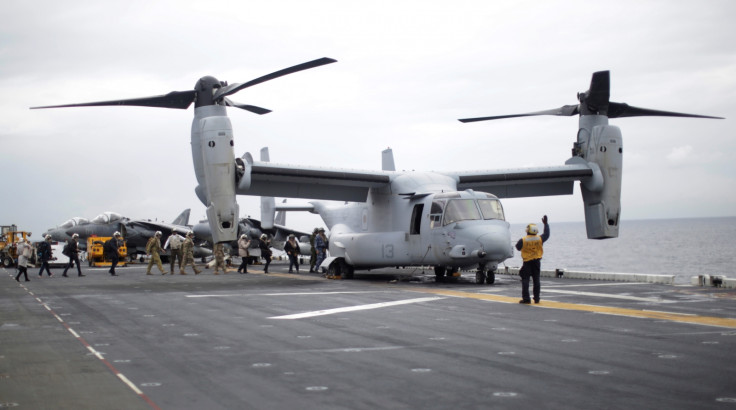Three US Marines missing at sea after Osprey aircraft crashes off Australia
Twenty-three of 26 personnel aboard the aircraft have been rescued.
Search and rescue operations were underway for three U.S. Marines who were missing after their Osprey aircraft crashed into the sea off the east coast of Australia on Saturday while trying to land.
Twenty-three of 26 personnel aboard the aircraft have been rescued, the Marine base Camp Butler in Japan said in a statement.
The MV-22 Osprey involved in the mishap had launched from the USS Bonhomme Richard and was conducting regularly scheduled operations when it crashed into the water, the statement said. The ship's small boats and aircraft immediately responded in the search and rescue efforts.
The Osprey is a tilt-rotor aircraft that takes off and lands like a helicopter, but flies like an airplane. They have been involved in a series of high-profile crashes in recent years.
The aircraft was in Australia for a joint military training exercise held by the U.S. and Australia last month in Shoalwater Bay. The Talisman Sabre exercise, a biennial event between the two nations, involved more than 30,000 troops and 200 aircraft.
Australian Defense Minister Marise Payne said Saturday's incident occurred off the coast of Shoalwater Bay in Queensland state.
"I can confirm no Australian Defence Force personnel were on board the aircraft," Payne said in a statement. "The United States are leading the search and recovery effort."
Payne said she had spoken with U.S. Defense Secretary Jim Mattis "to offer Australia's support in any way that can be of assistance."
The White House said that President Donald Trump was briefed on the matter by his chief of staff, John Kelly.
In 2015, a U.S. Osprey crashed during a training exercise in Hawaii, killing two Marines. Last December, a U.S. military Osprey crash-landed off Japan's southern island of Okinawa. Its five crew members were rescued safely. And in January, three U.S. soldiers were wounded in the "hard landing" of an Osprey in Yemen.

© Copyright IBTimes 2025. All rights reserved.





















